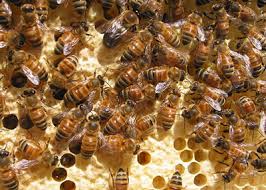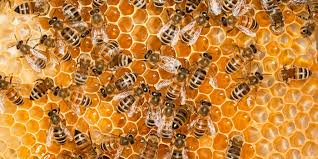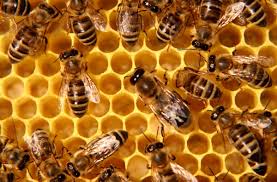
HONEY BEES
Honeybees are social insects that live in colonies. The hive population consists of a single queen, a few hundred drones, and thousands of worker bees. The honeybees we know forage for nectar and pollen from flowering plants.
Honey Bees

Honeybees are flying insects, and close relatives of wasps and ants. They are found on every continent on earth, except for Antarctica.
Bees of all varieties live on nectar and pollen. Without bees, pollination would be difficult and time consuming – it is estimated that one-third of the human food supply depends on insect pollination. Bees have a long, straw-like tongue called a proboscis that allows them to drink the nectar from deep within blossoms. Bees are also equipped with two wings, two antennae, and three segmented body parts (the head, the thorax, and the abdomen). Honeybees are social insects that live in colonies. The hive population consists of a single queen, a few hundred drones, and thousands of worker bees.
Identification:
Color: Black and yellow.
Shape: Oval.
Size: 1/2 inch long.
Food: Pollen and nectar is gathered from flowers to feed larvae and other colony members..
Habitat: Honey Bees can be found from holes in trees to the walls of your home.
Region: Many people believe that honey bees originated in Africa and spread to northern Europe, eastern India, China and the Americas. However, because honey bees have been domesticated to produce honey for human consumption, they are now found all over the world in different habitats.
Other Identifying Features/Behaviors:
- Barbed stingers which are torn off when bee tries to pull away.
Threats:
- If attacked, run in a zigzag pattern and seek shelter in a home or vehicle.
- Before moving or disturbing items that may be infested, inspect items carefully for signs of infestation.
- When handling items that may house nests, wear long sleeves and heavy gloves.
- Because nests may be very large, and bees are extremely aggressive, contact a pest control service to address an infestation.
 Little Rock, AR 501-868-3837 | Russellville, AR 479-968-4777 | Hot Springs, AR 501-442-5653 | Fayetteville, AR 479-899-6874
Little Rock, AR 501-868-3837 | Russellville, AR 479-968-4777 | Hot Springs, AR 501-442-5653 | Fayetteville, AR 479-899-6874






